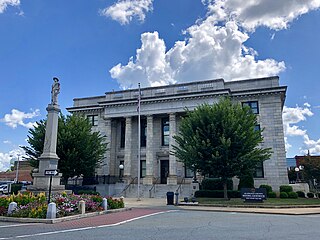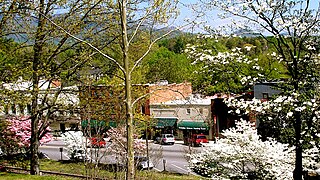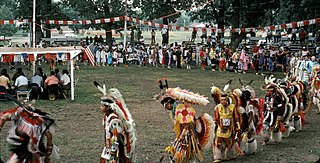Related Research Articles

North Carolina is a state in the Southeastern region of the United States. The state is the 28th largest and 9th-most populous of the United States. It is bordered by Virginia to the north, the Atlantic Ocean to the east, Georgia and South Carolina to the south, and Tennessee to the west. In the 2020 census, the state had a population of 10,439,388. Raleigh is the state's capital and Charlotte is its largest city. The Charlotte metropolitan area, with a population of 2,595,027 in 2020, is the most-populous metropolitan area in North Carolina, the 21st-most populous in the United States, and the largest banking center in the nation after New York City. The Raleigh-Durham-Cary combined statistical area is the second-largest metropolitan area in the state and 32nd-most populous in the United States, with a population of 2,043,867 in 2020, and is home to the largest research park in the United States, Research Triangle Park.

Greensboro is a city in and the county seat of Guilford County, North Carolina, United States. It is the third-most populous city in North Carolina after Charlotte and Raleigh, the 69th-most populous city in the United States, and the largest city in the Piedmont Triad metropolitan region. At the 2020 census, its population was 299,035. Three major interstate highways in the Piedmont region of central North Carolina were built to intersect at this city.

Guilford County is a county located in the U.S. state of North Carolina. As of the 2020 census, the population is 541,299, making it the third-most populous county in North Carolina. The county seat, and largest municipality, is Greensboro. Since 1938, an additional county court has been located in High Point. The county was formed in 1771. Guilford County is included in the Greensboro-High Point, NC Metropolitan Statistical Area, which is also included in the Greensboro-Winston-Salem-High Point, NC Combined Statistical Area.

Alamance County is a county in North Carolina. As of the 2020 census, the population was 171,415. Its county seat is Graham. Formed in 1849 from Orange County to the east, Alamance County has been the site of significant historical events, textile manufacturing, and agriculture.

Tryon is a town in Polk County, on the southwestern border of North Carolina, United States. As of the 2020 census, the city population was 1,562. Located in the escarpment of the Blue Ridge Mountains, today the area is affluent and a center for outdoor pursuits, equestrian activity, and fine arts.

A powwow is a gathering with dances held by many Native American and First Nations communities. Powwows today allow Indigenous people to socialize, dance, sing, and honor their cultures. Powwows may be private or public, indoors or outdoors. Dancing events can be competitive with monetary prizes. Powwows vary in length from single-day to weeklong events.

North Carolina Agricultural and Technical State University is a public, historically black land-grant research university in Greensboro, North Carolina. It is a constituent institution of the University of North Carolina System. Founded by the North Carolina General Assembly on March 9, 1891, as the Agricultural and Mechanical College for the Colored Race, it is the second college established under the provisions of the Morrill Act of 1890, as well as the first for people of color in the State of North Carolina. Initially, the college offered instruction in agriculture, English, horticulture and mathematics. In 1967, the college was designated a Regional University by the North Carolina General Assembly and renamed North Carolina Agricultural and Technical State University.

The Haw River is a tributary of the Cape Fear River, approximately 110 mi (177 km) long, that is entirely contained in north central North Carolina in the United States. It was first documented as the "Hau River" by John Lawson, an English botanist, in his 1709 book "A New Voyage to Carolina." The name is shortened from Saxapahaw, from the Catawban /sak'yápha:/, "piedmont, foothill", from /sak/, "hill", plus /yápha:/, "step". The river gives its name to a small town that formed on its banks.

Haskell Indian Nations University is a public tribal land-grant university in Lawrence, Kansas, United States. Founded in 1884 as a residential boarding school for Native American children, the school has developed into a university operated by the U.S. Bureau of Indian Affairs that offers both associate and baccalaureate degrees. The college was founded to serve members of federally recognized Native American tribes in the United States. It is the oldest continually operating federal school for American Indians.
United Indians of All Tribes is a non-profit foundation that provides social and educational services to Native Americans in the Seattle metropolitan area and aims to promote the well being of the Native American community of the area. The organization is based at the Daybreak Star Cultural Center in Seattle, Washington's Discovery Park. UIATF has an annual budget of approximately $4.5 million as of 2013.

The Poarch Creek Indian Reservation is a Creek Indian reservation in the state of Alabama. It is the home of the Poarch Band of Creek Indians, the only federally recognized Native American tribe in the state.
Demographics of North Carolina covers the varieties of ethnic groups who reside in North Carolina and relevant trends.

Alpha Pi Omega Sorority, Inc. (ΑΠΩ) is the oldest historically Indigenous national sorority in the United States. It is the largest Indigenous Greek letter organization, with 24 chartered chapters across nine states and the District of Columbia.
The Metrolina Native American Association (MNAA) is a Native American community association in Mecklenburg County, North Carolina. MNAA is a North Carolina state-recognized Urban Indian Center.
The history of Native Americans in Baltimore and what is now Baltimore dates back at least 12,000 years. As of 2014, Baltimore is home to a small Native American population, centered in East Baltimore. The majority of Native Americans now living in Baltimore belong to the Lumbee, Piscataway, and Cherokee nations. The Piscataway people are indigenous to Southern Maryland, living in the area for centuries prior to European colonization, and are recognized as a tribe by the state of Maryland. The Lumbee and Cherokee are indigenous to North Carolina and neighboring states of the Southeastern United States. Many of the Lumbee and Cherokee migrated to Baltimore during the mid-20th century along with other migrants from the Southern United States, such as African-Americans and white Appalachians.

Greensboro Ballet is a professional ballet company in North Carolina. It is the only ballet company in the Piedmont Triad. It is one of the few non-profit ballet companies in North Carolina. Greensboro Ballet has presented works by George Balanchine. The company also has performed a number of works made especially for the Greensboro Ballet by Rick McCullough, Jill Eathorne Bahr, Leslie Jane Pessemier, and alumni Emery LeCrone. Maryhelen Mayfield, who served as artistic and executive director of Greensboro Ballet from 1980 to 2019, choreographed over twenty-five works for the company.

Christopher Michael Sgro is an American politician and political strategist best known for his work advocating for LGBT rights in North Carolina. He is a former member of the North Carolina House of Representatives and former Executive Director of Equality North Carolina. In 2017, Sgro became Communications Director of the Human Rights Campaign, the largest LGBT rights organization in the United States. He currently works as spokesperson for Facebook.
The following is a timeline of the history of the city of Greensboro, North Carolina, USA.

The Coharie Intra-tribal Council, Inc. is a state-recognized tribe in North Carolina. The headquarters are in Clinton, North Carolina.

The Greensboro Cultural Center is a City of Greensboro Office of arts & culture facility, and is home to many arts-related programs in Greensboro, North Carolina.
References
- ↑ "American Indians in North Carolina". Children's Services Practice Notes. North Carolina Division of Social Services. February 2006. Archived from the original on 2007-06-12. Retrieved 2017-12-30.
- ↑ Paredes, J. Anthony (1992). Indians of the Southeastern United States in the Late 20th Century . Tuscaloosa: University of Alabama Press. p. 53. ISBN 0-8173-0534-3.
- ↑ Linton, Brenda; Stewart, Leslie S. (2003-08-13). "Section 1: Background" (PDF). Economic Development Assessment for the Guilford Native American Association. Office of Economic Development, University of North Carolina. Archived from the original (PDF) on 2007-07-05. Retrieved 2007-05-25.
- ↑ "North Carolina American Indian History Time Line". North Carolina Museum of History . Archived from the original on 2012-05-14. Retrieved 2023-03-22.
- 1 2 "A Brief History". Guilford Native American Association. Archived from the original on 2009-01-10. Retrieved 2011-07-28.
- ↑ Reilly, Annie (2001-09-12). "Native American Group Celebrates 25th Powwow". Greensboro News & Record . Retrieved 2017-07-20.